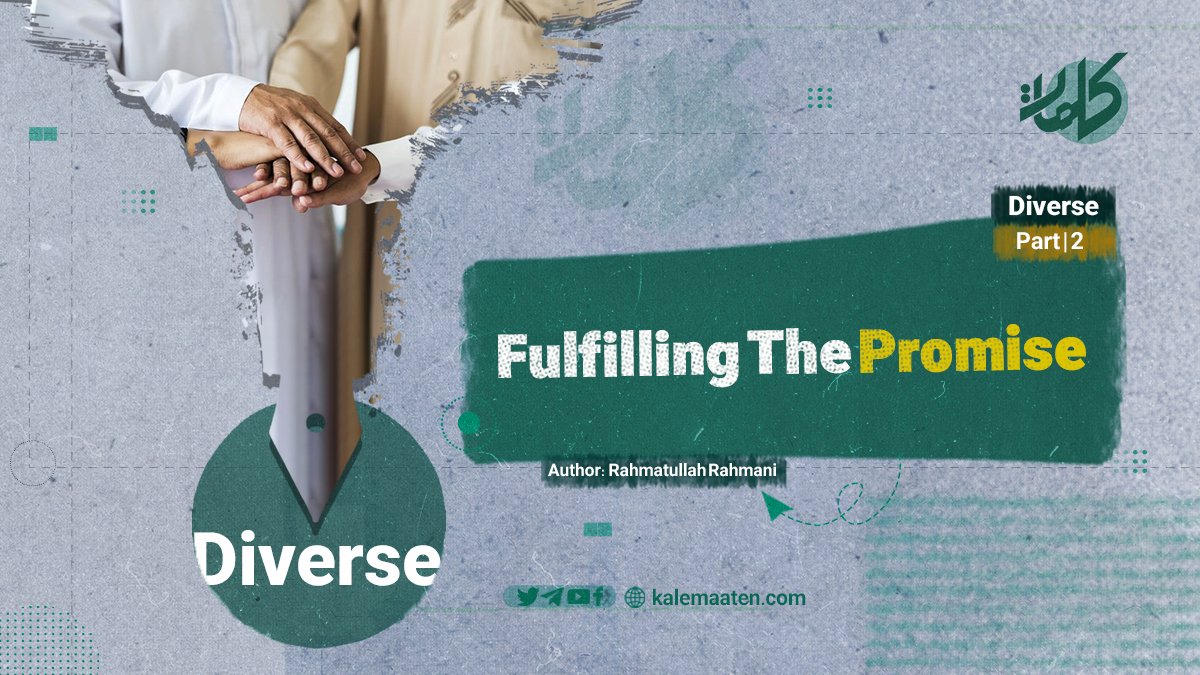
Author: Rahmatullah Rahmani
Fulfilling The Promise (Part Two)
Loyalty:
Whenever a Muslim enters into a contract or agreement, it is obligatory for them to honor it. Likewise, if they make a promise or pledge to someone, they must remain committed and adhere to it. It is part of faith for a person to be truthful to their words and to act upon what they say. As a result, their statements will be regarded among people as firm covenants and trustworthy commitments, free from the fear of deception or betrayal.
Fulfilling promises is obligatory, just as keeping oaths is. However, this obligation applies only when the promise or oath pertains to truth, goodness, and righteousness. If it involves sin or wrongdoing, fulfilling it is not valid.
The Messenger of Allah (peace and blessings be upon him and his family) said: «مَنْ حَلَفَ على يمين فرأى غيرها خيراً منها، فَلْيُكَفِّرْ عَنْ يَمِينِهِ وَلْيَأْتِ الَّذِي هُوَ خَيْرٌ» “Whoever makes a promise by oath and swears to do something, then realizes that something else is better, he should choose it and make expiation for his oath and do that which is better.” [1]
In such cases, it is not permissible to insist on doing what one has sworn to do; rather, it is better to break the oath. The hadith states: «لَأَنْ يَلُجَّ أَحَدُكُمْ بِيَمِينِهِ فِي أَهْلِهِ آثمٌ لَهُ عِنْدَ اللهِ تَعَالَى مِنْ أَنْ يُعْطِيَ كَفَّارَتَهُ الَّتِي افْتَرَضَ اللهُ عَلَيْهِ» “If one of you insists on acting according to their oath within their family, the sin of doing so in the sight of Allah is greater than the sin of breaking the oath and paying the required expiation.” That is, if someone swears to carry out an action within their family and later realizes that it is not good, they should not persist in fulfilling their oath, as the sin of doing so is greater than the sin of breaking it and offering the expiation. [2]
Therefore, no promise or covenant is valid except in matters of goodness and righteousness. If a pledge is made for a noble and virtuous cause, one must dedicate their life to fulfilling it and ensuring its execution. The principles of chivalry, honor, faith, and certainty leave no room for doubt or regret.
Hazrat Anas bin Malik (may Allah be pleased with him) narrated:
My uncle, Anas bin al-Nadr, was absent from the Battle of Badr. He said, “O Messenger of Allah! I was not present at your first battle against the polytheists. If Allah grants me the opportunity to participate in another battle alongside the Prophet (peace and blessings be upon him), you will see what I will do!”
When the Battle of Uhud arrived and the Muslims began to retreat, he declared: “O Allah! I disavow the actions of those who have turned back and the actions of the polytheists.” Then, he charged into battle.
Sa’d bin Mu’adh encountered him and heard him say: “O Sa’d bin Mu’adh! By Allah, I am heading toward Paradise, and I can already smell its fragrance near Mount Uhud!” Sa’d later said: “O Messenger of Allah! I could not do what he did.”
Anas bin Malik continued: “We later found his body covered in wounds from swords, spears, and arrows. The polytheists had mutilated him so severely that only his sister could recognize him—either by a mark on his body or by his fingers.”
Hazrat Anas (may Allah be pleased with him) then said: “We believe that the following verse was revealed about him and those like him:” «مِنَ الْمُؤْمِنِينَ رِجَالٌ صَدَقُوا مَا عَاهَدُوا اللَّهَ عَلَيْهِ فَمِنْهُم مَّن قَضَى نَحْبَهُ وَمِنْهُم مَّن يَنتَظِرُ وَمَا بَدَّلُوا تَبْدِيلًا» “Among the believers are men who have remained true to their covenant with Allah. Some of them have fulfilled their duty (and have been martyred), and some are waiting (for an opportunity to sacrifice their lives in the way of Allah), and they have not changed their covenant in any way.” [3]
Keeping a covenant requires two essential elements. When these two elements are perfected in the human soul, keeping a covenant and fulfilling what we have committed ourselves to becomes easy. Allah took a firm covenant from Adam, the first man, not to approach the forbidden tree, but it was not long before Adam became forgetful and weak and broke his covenant: «وَلَقَدْ عَهِدْنَا إِلَى آدَمَ مِن قَبْلُ فَنَسِيَ وَلَمْ نَجِدْ لَهُ عَزْمًا» “We had made a covenant with Adam before, but he forgot, and We found no firm resolve in him.” [4]
Therefore, weak memory and weak will are two major obstacles that may prevent a person from fulfilling their covenant. Due to various events, worries, and preoccupations that a person encounters, they may be affected by the passage of time in such a way that even the most prominent and important notes in their mind fade away and become obscure. Therefore, they always need reminders and guidance to overcome the waves of forgetfulness and to keep the things that may be forgotten in front of their eyes so that they do not go unnoticed.
And how many verses of the Holy Quran have been given to remind: «اتَّبِعُوا مَا أُنزِلَ إِلَيْكُم مِّن رَّبِّكُمْ وَلَا تَتَّبِعُوا مِن دُونِهِ أَوْلِيَاءَ قَلِيلًا مَّا تَذَكَّرُونَ» “Follow what has been revealed to you from your Lord, and do not follow other guardians besides Allah, for you remember little.” [5]
«وَهَذَا صِرَاطَ رَبِّكَ مُسْتَقِيمًا قَدْ فَصَّلْنَا الْآيَاتِ لِقَوْمٍ يَذَّكَّرُونَ» “This is the path of your Lord, the straight path. We have explained the verses clearly for a people who remember.” [6]
Continues…


